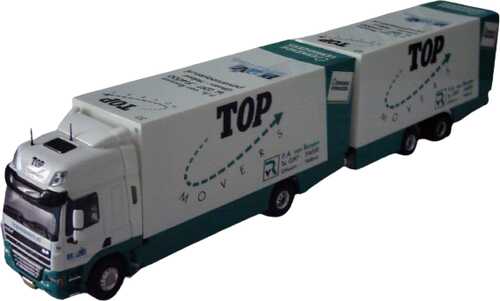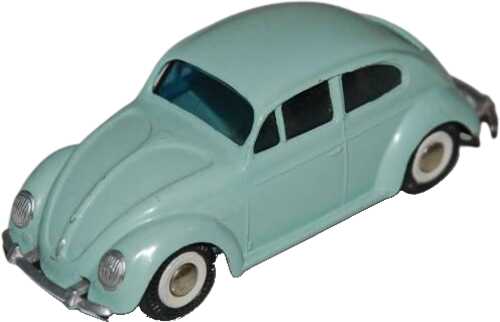An example of a Tekno model:



The Tekno brand was founded in 1928 by Mr A. Siegumfeldt as ´Tekno Dansk Legetojs Industri´ in a basement of a house in the Danish town of Vanlose, near Copenhagen. Here, under very simple conditions, the now world-famous company was started.
In 1930, he had unveiled a series of models to the "Federation of Danish Industries" and Tekno received the first prize on that occasion for best model.
Denmark imported many toys around the 1930s and had restrictions in the opposite direction. The Tekno-Denmark company also has a rather distinct history, with longtime Danish manufacturers falling to the wayside until 1972.
Tekno was the only Scandinavian company that managed to produce complicated die-cast (toy) models, comparable to German companies like: Schuco , Märklin, or Gama Toys. Supposedly in late 1945, production of die-cast vehicles began at the main factory in Kirkebjerg and in the 1950s Tekno gradually became a major competitor even to Dinky toys. The factory had around 200 employees in the 1950s. Expansion led between 1950 and 1969, in addition to the foundry in Norway, further into Sweden with Svenska Tekno AB, which became a success, but due to import bans outside Norway, the Tekno name on toys was replaced by other terms.
From 1949 to about 1969, many Tekno models were also manufactured by or in cooperation with H. Langes Legetøj ("Langes Toys"), a foundry in Copenhagen, which in turn cooperated with "Termax" which was located in the same building on Nyrnbergade.
In 1969, the cooperation was dissolved by Tekno-Dk.
Tekno was known for its preference for the Swedish car manufacturer Volvo, and had a reputation for accuracy and realism. An example of that focus was the Mercedes-Benz 230 SL cabriolet in 1:43 scale. However, Tekno-boxes were normally rather bland, usually red with images of the cars on the sides and on the head of the box: company name, product name and serial number.
Unlike most other manufacturers of moulded cars, Tekno did not give in to the temptation of shiny low-friction wheels on their vehicles.
Although the company stayed true to its roots in producing more realistic models, this did not benefit product sales.
In 1969, Siegumfeldt died and his legacy came to his son and daughter.
The son has no interest in continuing the name, but the daughter {we see this elsewhere with model car manufacturers too ...} was promising. It wasn't long before problems arose with the company, and financial problems led to its sale two years later.
However, financial problems arose there too - but also because only four employees with the necessary expertise had gone with it - followed by low production, high costs and a new factory meant the end for Tekno in Denmark in 1972. All machines and tools, together with the brand name, were sold and moved to the Netherlands.
In 1989, however, the word Toys disappears from the name. Due to the excellent quality, customers lose the association with toys.
In 2003, the company opened its own museum at the production plant in De Lier, containing over 7,500 old and new models.
In 2010, Lion Toys {See seperate feature} is taken over by Tekno B.V.
Tekno is now one of Europe's leading suppliers of miniature trucks and buses.
Tekno, in addition to its own production, mainly makes scale [1:50 and very occasionally 1:87] models of original and existing trucks built for many well-known companies and organisations. The strength of the products of Tekno" is the level of quality down to the last detail that was already a solid and almost unassailable column under the founders' management, making this company the market leader in the field of high quality cast miniatures.
